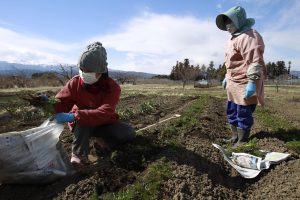In early February, Taiwan’s Tsai Ing-wen administration announced that it would lift restrictions on food imports from five prefectures in Japan, including Fukushima. The move is a vital step for Japan-Taiwan relations, lending a boost to ties and giving impetus to Japanese government support for a Japan-Taiwan free trade agreement (FTA) and the accession of Taiwan to the Comprehensive and Progressive Agreement for Trans-Pacific Partnership (CPTPP).
Why has the issue of Fukushima food safety been an impediment to headway in Japan-Taiwan relations?
Since the 1990s, Japan’s perception of Taiwan has steadily improved and bilateral relations have been gradually strengthening. The major turning point came with the Great East Japan Earthquake in March 2011. The donation of 25 billion yen by Taiwan’s private sector in the wake of the disaster made a strong impression on Japan, inspiring a sense of gratitude that engendered widespread support for Taiwan from the public as well as bipartisan support in the Diet. This prompted the Democratic Party of Japan’s Noda Yoshihiko administration and the subsequent government of the Liberal Democratic Party’s Abe Shinzo to take steps to bolster ties, finally concluding a string of agreements that had hitherto seen little progress. These included a fisheries agreement, an investment agreement, and an open skies agreement.
When the Democratic Progressive Party’s Tsai Ing-wen administration came to power in May 2016, Abe sought to take another step in relations, including a possible FTA. At that time, the Abe administration called for Tsai’s administration to retract the decision made in the final stages of the Ma Ying-jeou government to deny EEZ status to Okinotorishima, Japan’s southernmost territory, on the grounds that it was not an island but a “rock,” and to remove restrictions on food imports from Fukushima and other prefectures. Taiwan’s support for Fukushima and other disaster-stricken areas had been the catalyst for the Japanese government’s efforts to strengthen relations with Taiwan, and it was felt that those efforts would be hampered by the public perception of Taiwan’s import restrictions on produce of Fukushima and other prefectures as an attempt to hinder rather than support the reconstruction of the disaster-stricken areas.
In response, the government of Tsai Ing-wen did achieve a resolution on Okinotorishima, but was unable to resolve the Fukushima food issue. Food safety is a sensitive issue for Taiwanese citizens and, at the time, food from Fukushima and other prefectures was considered contaminated, or “nuclear food.” With the opposition Kuomintang party opposing the lifting of restrictions on food imports, it had also become a political issue. A ban on food imports from Fukushima and other prefectures was approved in the 2018 referendum, and import restrictions were put in place until the end of 2021. Various requests by the Abe administration from 2017 to lift the ban went unheeded by Taipei. As a result, official exchanges between Japan and Taiwan effectively stalled.
However, the COVID-19 pandemic created a turning point in relations. Even prior to the outbreak of the virus, at the initiative of Japan’s then Foreign Minister Kono Taro, the Japanese government had begun to demonstrate clear support for Taiwan’s participation in the World Health Assembly. In 2021, the tenth anniversary of the Great East Japan Earthquake, the Japanese government donated vaccines to Taiwan as a way of repaying Taiwan for its aid in the wake of that disaster. Japan’s gesture was welcomed by the Taiwanese public, but the Fukushima food issue persisted.
Then, two important events occurred in 2021. The first was Taiwan’s application to join the CPTPP, a move linked to China’s application for membership. It was a tough choice for the Tsai administration, with some wondering if membership was even possible for Taiwan given its sensitivity in respect of food imports, and worrying that it may create a burden for Tsai. The other major event was a referendum at the end of 2021. One referendum proposal concerned U.S. pork imports. KMT’s proposal was to put import restrictions on pork in place for the next two years, given that Taiwan had shunned the import of U.S. pork containing the growth promotant ractopamine. The Tsai administration attaches great importance to relations with the U.S. and opposed the import restrictions, launching a campaign in December urging people to vote No to all four referendum proposals. Although the odds of securing a No vote seemed low, in fact the No vote passed, and Taiwan’s government could now for the first time consider the food issue as “manageable.”
In 2022, with vaccine support from Japan, the successful resolution of the U.S. pork issue, and its application for accession to the CPTPP underway, Tsai’s government decided to abolish import restrictions from Fukushima and other prefectures, given that the ban on imports passed in the 2018 referendum had expired. The decision so early in the Lunar New Year may have been motivated by the upcoming CPTPP accession negotiations. However, it was also likely timed to minimize the impact on the combined local elections scheduled for November 2022.
At any rate, it will remove a thorn in the side of bilateral ties. Although Taiwan has attached conditions, including the inspection of all imported products, the decision will inject new life into Japan-Taiwan relations. The Japanese government of Kishida Fumio has yet to take a clear stance on Taiwan, but it will have to react in some fashion. The ball is now in Japan’s court.

































